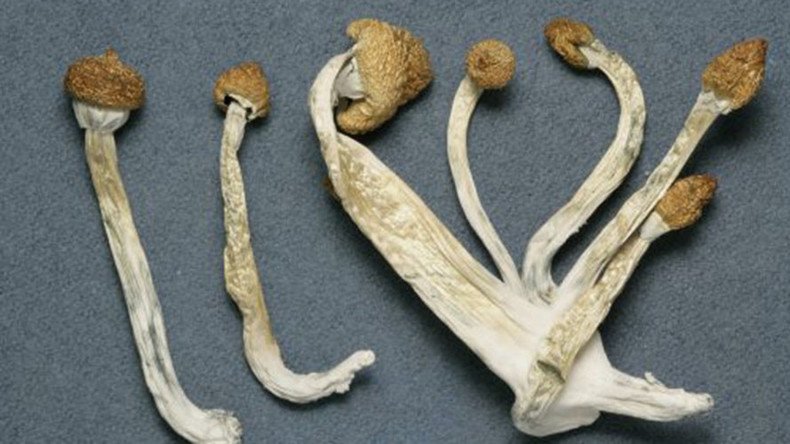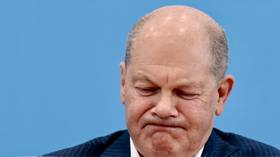Magic mushrooms: Psychedelic drugs ease anxiety for people with life-threatening cancer

Two studies show that 80 percent of cancer patients who are given a single high dose of the psychedelic compound psilocybin ‒ aka “magic mushrooms” ‒ showed relief from depression and anxiety six months later.
“The most interesting and remarkable finding is that a single dose of psilocybin, which lasts four to six hours, produced enduring decreases in depression and anxiety symptoms, and this may represent a fascinating new model for treating some psychiatric conditions,” Roland Griffiths, professor of behavioral biology at the John Hopkins University School of Medicine, said in a statement.
Psilocybin: A journey beyond the fear of death? https://t.co/QaSi76HeqQpic.twitter.com/8ejRmmu5va
— Scientific American (@sciam) December 1, 2016
The results come from two small, double-blind, random studies, that were published Thursday and conducted by researchers at John Hopkins University and at New York University, with cancer patients and single doses of psilocybin.
The John Hopkins study involved 51 people with potentially life-threatening cancer diagnoses who completed a five-week session of low and high doses of psilocybin. The study from NYU’s Langone Medical Center was carried out on 29 participants, mostly women of ages 22 through 75.
Two New Studies Find Psilocybin Relieves Cancer Patients' Anxiety and Depression https://t.co/dhZyxyAsBl
— reason (@reason) December 1, 2016
For that study, half of the participants were randomly assigned to receive a 0.3 milligrams per kilogram dose of psilocybin, while the rest received a vitamin placebo of 250 milligrams of niacin, known to produce a “rush” that mimics a hallucinogenic drug experience.
Halfway through the five-week study period, all participants switched treatments. Neither patients nor researchers knew who had first received psilocybin or the placebo.
“The randomization, placebo control, and double-blind procedures maximized the validity of the study results,” NYU co-study investigator Dr. Jeffrey Guss said.
Gonzo strains: Hunter S. Thompson's widow to clone his marijuana https://t.co/CZV2q2gDOYpic.twitter.com/D4JDchV3wA
— RT America (@RT_America) December 1, 2016
In a video, NYU study participants described their experiences as “old fear was peeling off my body,” “seeing colorful images,” “feeling complete peace,” “floating on an immense sea of expansive of strengths and beauty” and “I saw my fear.”
Later, patients described feelings of connection: “I felt this connection with everything,” “a sense of connectedness that runs through all of us,” “I felt that I was bathed in love,” and “I was feeling pure love,” and later thoughts of gratitude “for everything for being alive, no matter whatever happens.”
In the Hopkins study, the compound was found to increase thoughts of quality of life, life meaning and optimism, and a reduction in “depressed mood, anxiety and death anxiety.”
3,000yo brain surgery patient likely treated with #marijuana & magic mushrooms https://t.co/CtK5Gzdupqpic.twitter.com/P5pgZTRZtg
— RT America (@RT_America) August 19, 2016
Six months after the final session treatment, 80 percent of participants showed clinically “significant decreases in depressed mood and anxiety, with about 60 percent showing symptom remission into the normal range.”
The study also found that “67 percent reported the experience as one of the top five meaningful experiences in their lives, and 70 percent reported the experience as one of their top five spiritually significant lifetime events.”
Traditionally, people with cancer who suffer from anxiety are offered traditional psychotherapy including behavioral therapy and antidepressants, which can weeks or even months to kick in and aren’t always effective. On top of that, some drugs can be addictive and have troubling side effects.
"Before beginning the study, it wasn't clear to me that this treatment would be helpful, since cancer patients may experience profound hopelessness in response to their diagnosis, which is often followed by multiple surgeries and prolonged chemotherapy," Griffiths said.
"I could imagine that cancer patients would receive psilocybin, look into the existential void and come out even more fearful. However, the positive changes in attitudes, moods, and behavior that we documented in healthy volunteers were replicated in cancer patients."












